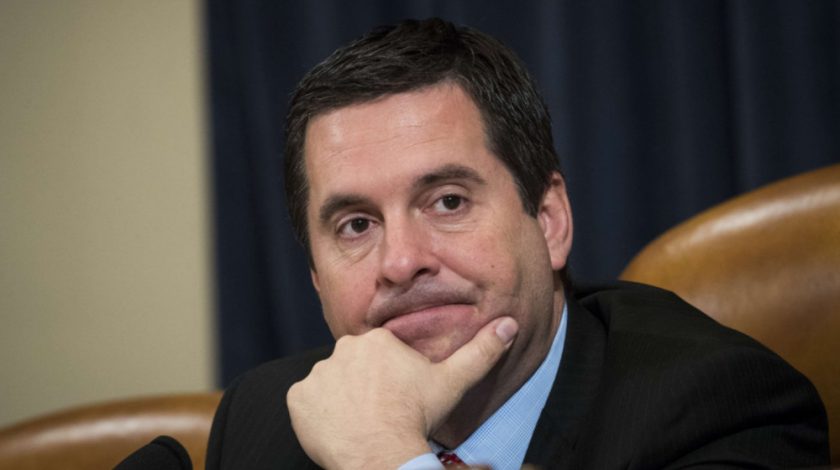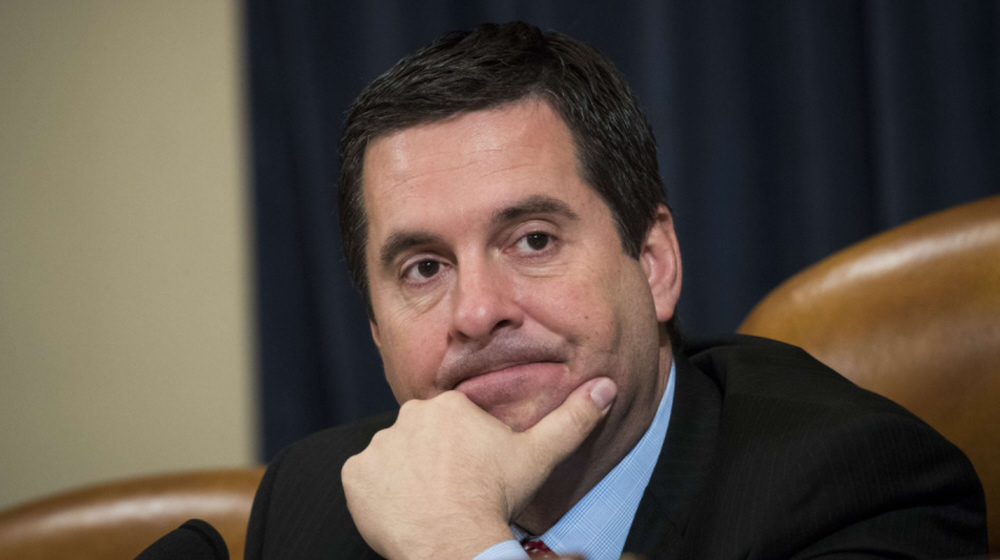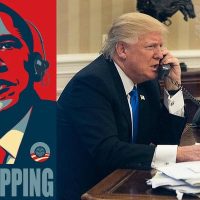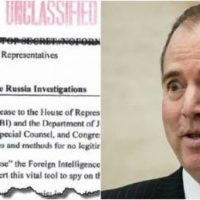Published by: Daily Signal
By: John G. Malcolm
On Friday, the House Intelligence Committee released the so-called Nunes memo, after Rep. Devin Nunes, R-Calif., the chairman of that committee. The much-anticipated, four-page memo was advertised as containing “shocking” and “jaw-dropping” evidence of abuse by the FBI in seeking an order (and three subsequent renewal orders) from the Foreign Intelligence Surveillance Court (FISC) to spy on Carter Page, a volunteer foreign policy adviser to the Trump campaign who had previously worked as an investment banker in Moscow.
The crux of the controversy stems from the FBI’s apparent use of a highly-controversial dossier that was prepared by Christopher Steele, a former British spy and a longtime confidential FBI source, who, it has been reported, provided information to the FBI during a federal probe into alleged corruption at FIFA, the world soccer organization.
Prior to the memo’s release, President Donald Trump tweeted that “[t]he top Leadership and Investigators of the FBI and the Justice Department have politicized the sacred investigative process in favor of Democrats and against Republicans – something which would have been unthinkable just a short time ago.” And shortly after its release, he tweeted that the memo “totally vindicates” him in connection with “the Russian Witch Hunt.”
Some Democrats, on the other hand, believe that the memo takes facts out of context and presents a deliberately misleading version of the facts, that it reveals sensitive sources and methods of intelligence work that could endanger lives and embolden our enemies, and that releasing the memo was reckless and could be “treasonous.” They claim that the memo’s release was motivated by a desire to derail the ongoing investigation being conducted by Special Counsel (and former FBI Director) Robert Mueller.
And prior to the memo’s release, the FBI issued a statement that it had “grave concerns about material omissions of fact that fundamentally impact the memo’s accuracy.”
So who’s right about the remaining charges? Well, there is no clear answer to that, at least not yet. Some things, however, are clear.
First, any claim that releasing the Nunes memo is tantamount to an act of treason is far-fetched, to say the least. It is difficult to see how the memo reveals sources and methods that could imperil the integrity of current or future national security investigations or endanger the lives of those who provide pertinent information to assist such investigations. Indeed, almost all of the factual information in the Nunes memo has already been reported by prominent media outlets.
As to the remaining allegations, here is some background. The Foreign Intelligence Surveillance Act of 1978 (“FISA”) establishes the procedures that government must follow before it can engage in electronic surveillance against individuals, including Americans, in national security investigations. Under FISA, the government must submit an application for a warrant to a judge on the Foreign Intelligence Surveillance Court. The application must contain “a statement of facts and circumstances” that the government is relying upon to justify its belief that the target is “an agent of a foreign power.” Before the application is submitted, it must be reviewed and approved by the director or deputy director of the FBI, and then reviewed and approved by the attorney general, the deputy attorney general (“DAG”) or the assistant attorney general for the National Security Division of the Department of Justice. Once this happens, the application may be submitted to the Foreign Intelligence Surveillance Court “by a Federal officer in writing upon oath or affirmation.” If after reviewing the application, a FISA judge believes that probable cause exists to believe that the target is a foreign agent, he can issue the warrant for a period of up to 90 days, subject to renewal.
The Nunes memo states that the government first sought and obtained a Foreign Intelligence Surveillance Court order authorizing electronic surveillance of Carter Page on Oct. 21, 2016, and then sought and obtained three renewals from the Foreign Intelligence Surveillance Court, each of which required a new application utilizing the same procedure outlined above. The memo goes on to state that then-Director James Comey signed three of those applications and then-Deputy Director Andrew McCabe signed one of the applications on behalf of the FBI, and that then-DAG Sally Yates, then-Acting DAG Dana Boente, and current DAG Rod Rosenstein each approved one or more of the four applications that were submitted to the Surveillance Court.
The Nunes memo contains very little information about the contents of any of the applications. Democrats claim that the underlying classified information, which they have reviewed, contains lots of information that would justify the issuance of a warrant here.
The memo states that the application(s) also contained information about another Trump campaign foreign policy adviser, George Papadopoulos, who became the subject of an independent counterintelligence investigation by the FBI in July 2016. On Oct. 3, 2017, Papadopoulos entered a guilty plea to a charge of lying to FBI agents about the existence and scope of contacts he had with people he believed had substantial connections to senior Russian government officials and who claimed to have damaging information about Hillary Clinton and who were interested in facilitating a meeting between Trump and Vladimir Putin. It is unclear what connection, if any, existed between Papadopoulos’ contacts with Russian officials or their self-proclaimed intermediaries and Page’s contacts with such people.
It has also been reported that the FBI started looking at Page as a possible Russian agent (witting or unwitting) as early as 2013. The memo does not disclose what information the FBI might have gathered that implicated Page that was independent of the Steele dossier. It is, of course, possible that this missing information may have been sufficient to establish probable cause to believe that Page was acting as a foreign agent.
This much, however, is clear from the Nunes memo. Regardless of the truth, the FBI has left itself vulnerable to the charge that it was either acting with partisan intent or willing to serve as a catspaw for the Clinton campaign, the Democratic National Committee, and other anti-Trump forces.
According to the Nunes memo, the Steele dossier “formed an essential part” of the Carter Page FISA application on Oct 21, 2016 and, presumably, the subsequent renewal applications. In June 2017, Comey testified that the information contained in the Steele dossier about Trump was “salacious.” More important, Comey admitted that the information contained in the Steele dossier was “unverified.” The memo also states that, according to Bill Priestap, the assistant director in charge of the FBI’s counterintelligence division, the FBI’s efforts to corroborate the information in the Steele dossier was in its “infancy” at the time the original FISA application was submitted.
The Nunes memo also claims (although others have disputed this) that in December 2017, Deputy Director McCabe testified before the House Intelligence Committee that without the information in the Steele dossier, the government would not have sought a surveillance warrant from the Foreign Intelligence Surveillance Court, suggesting that the FBI did not believe that probable cause existed based on the information it gathered on its own.
Independently corroborating the information in the Steele dossier was particularly important in this instance because, despite the fact that Steele had proven to be a reliable source in the past, he had an obvious bias and a desire to dish (or fabricate) dirt on Trump.
For starters, Steele was hired by a research firm named Fusion GPS to prepare the dossier at the behest of the Clinton campaign and the DNC, and he was paid $160,000 (plus, the memo implies, some additional amounts of money by the FBI) for those efforts, all of which was known to the FBI at the time they applied for the initial FISA warrant.
Moreover, the FBI also knew that Steele personally detested Trump. According to the memo, in September 2016, a month before the government filed its initial FISA application, Steele told then-Associate Deputy Attorney General Bruce Ohr (who reported directly to DAG Yates and then DAG Rosenstein) that he “was desperate that Donald Trump not get elected and was passionate about his not being president.”
The memo also states that the original FISA application cited an article in September 2016 that appeared in Yahoo News about a trip Page took to Moscow the previous July as an independent source that corroborates some of the information in the Steele dossier. It turns out, however, that the source for the information in the Yahoo News story was none other than Christopher Steele.
And Yahoo News was not the only media source that Steele was talking to. No doubt anxious to get his story out in time to affect the outcome of the election, Steele also provided salacious information to Mother Jones magazine which published its own article. During his discussions with Mother Jones, Steele outed himself as an FBI source, presumably to bolster his own bona fides and the credibility of the information he was imparting. According to the memo, it was this revelation that prompted the FBI to formally suspend and then terminate using Steele as a trusted source.
This does not mean, however, that the FBI and DOJ stopped receiving information from Steele. Indeed, the memo states, Steele continued to meet with Ohr, whose wife worked at Fusion GPS, after he was terminated as an official FBI source.
According to the Nunes memo, none of this was disclosed to the Foreign Intelligence Surveillance Court in any of the applications, although others claim that the FISA application did disclose that Steele was being paid by a law firm working for a major political party.
All attorneys, including attorneys who work for the FBI and the Department of Justice owe a duty of candor to the court, which means they must disclose “all material facts known to the lawyer that will enable the tribunal to make an informed decision, whether or not the facts are adverse.” It certainly appears as though the information about Steele’s obvious bias and the fact that the information had been procured by Trump’s opponent was “material” and should have been disclosed to the court. If the government had disclosed this information, would the Foreign Intelligence Surveillance Court judge have signed the warrant anyway? We will never know.
It is also unclear whether the failure to disclose this information might result in any evidence obtained by these warrants being excluded from any criminal trial. In 1978, in Franks v. Delaware, the Supreme Court held that a court should void a warrant, and exclude any evidence derived therefrom if a defendant can establish that the officer who swore out the warrant “knowingly and intentionally, or with reckless disregard for the truth” included information that was false or excluded information that was true which would have been critical to the probable cause determination. While courts are traditionally reluctant to exclude evidence on this basis, they have done so when an affidavit hinged substantially on an informant’s claims and the government failed to disclose a known bias by the informant which, if disclosed, would have fatally undercut a finding of probable cause.
Some Democrats have charged that Republicans released the Nunes memo in order to disrupt the ongoing Mueller investigation. I seriously doubt that the Nunes memo will disrupt that investigation. Bob Mueller is a seasoned professional with decades of law enforcement experience who is unlikely to be deterred by anything in the Nunes memo, which is not to say, however, that it will not have an impact on how the public perceives the results of that probe. While that would certainly be regrettable, it is a self-inflicted wound by the FBI.
Will we ever learn whether the bias at the FBI was real or apparent? While it is hard to say at this point, we may learn a lot more in the near future when DOJ Inspector General Michael Horowitz releases the report his office has been working on regarding the Bureau’s handling of the Clinton email server investigation.
That investigation, as well as the Michael Flynn investigation which resulted in his guilty plea, was led by Deputy Director McCabe, who recently left the Bureau ahead of his previously-scheduled retirement. It has been reported that the forthcoming report played a significant role in McCabe’s decision. McCabe’s wife had recently run, unsuccessfully, as the Democratic candidate for a Virginia state senate seat; her campaign received nearly $700,000 from entities closely associated with then-Gov. Terry McAuliffe, a long-time friend and confidante of the Clintons. At the very least, McCabe’s decision to lead these investigations showed questionable judgment, even though he had been cleared to do so by the FBI’s ethics office.
FBI Special Agent Peter Strzok and senior FBI lawyer Lisa Page, who were romantically involved, were also involved in these investigations and expressed disdain for Trump and a fear that he might win the election in thousands of text messages that they sent to each other. The inspector general’s report is likely to address the extent to which their animus towards Trump might have tainted these investigations.
Did bias affect the activities of the FBI in connection with its investigations into possible collusion between the Trump campaign and the Russians or Hillary Clinton’s use of a private server to receive and transmit classified information? The matter should be thoroughly and dispassionately (to the extent that is possible in Washington, D.C.) investigated. The matter is too important to do otherwise.
The FBI has been given the ability to use some powerful and necessary tools to spy on Americans in limited and appropriate circumstances in order to keep us safe. This is an awesome power which must be wielded responsibly, and never for political purposes. Courts are entrusted with overseeing this process, and rely on the government providing the courts with all pertinent information so that they can assess whether the government has met the applicable legal standards that justify the use of those tools. When the government fails to provide that information, especially in an investigation with such obvious political overtones, it leaves itself vulnerable to the charge that it was trying to game the system for political purposes. Let’s hope that was not the case.
Link: http://dailysignal.com/2018/02/04/the-facts-currently-known-about-nunes-memo-fbi-bias-accusations/
Want more BFT? Leave us a voicemail on our page or follow us on Twitter @BFT_Podcast and Facebook @BluntForceTruthPodcast. We want to hear from you! There’s no better place to get the #BluntForceTruth.








